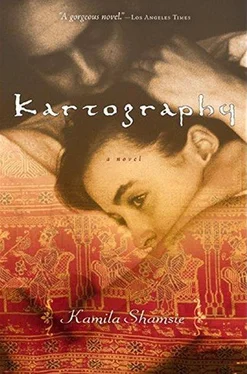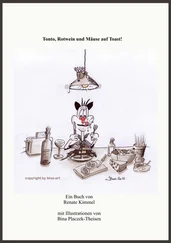Steel hooks latched on to the weightlessness of the air when he said that. A stillness infected everyone, even me, though I didn’t understand the remark. Looking around, I saw I was the only one who didn’t understand it. Uncle Asif and Aunty Laila were standing together, holding hands like little children. Ami just looked at my father and in the sadness of her expression I heard her voice echoing from years away. Zafar, sometimes I think I love you more than I should. And Karim had recoiled, his eyes moving all around the room, settling momentarily on every face except mine, his voice, staccato, saying ‘but if’ and ‘that time’ and ‘how’ and ‘so why did’ and, finally, as he turned to look at me, ‘Oh God, what have I done?’
‘I did this, not you,’ Aba said. ‘Raheen, look at me. It’s time you heard the truth.’
I closed my eyes and, half-turning, leaned against the wall. The white paint was cool against my cheek and tongue. All my life I’d visited this house and never thought to taste the walls. What an odd and misleading thing familiarity is; so ready to disguise itself as intimacy.
‘It was soon after the war ended,’ Aba began. ‘My neighbours, in those days, were the Mumtazes. A lovely couple, and their sons Bilal and Shafiq. Shafiq and I had been at school together. Bilal was a year younger. He was in East Pakistan, Bilal was, when the war broke out. His parents had been telling him for a long time to come home and he’d said he would but he kept delaying his return. Rumour was there was a girl there.’ Aba’s voice was strange, a monotone. I reached out to touch his sleeve, but something in Karim’s glance made me drop my hand.
Aba continued speaking, without even noticing. ‘Shafiq was alone at home when the telegram came. Pink. The telegrams were pink. He’d been stirring his tea, still had a spoon in his hand, and it dropped tea on to one corner of the telegram.’ It was as though he was talking about a movie he had once seen.
‘He looked across the street and saw my house. I wasn’t directly opposite him, but close. Close enough that Bilal could hobble over to visit in the days when he had an injured ankle. He was always injuring himself playing some sport or other, and his ankle was so prone to fractures and swellings we were all convinced he’d end up permanently on crutches by the time he was middle-aged. Weren’t we, Laila?’ He’d been inspecting a piece of glass all this while, but he finally looked up and smiled at Aunty Laila.
‘Zafar, don’t,’ she said.
I looked at Ami. She put a hand on my shoulder and gripped tight. I moved away from the contagion of fear in her fingertips, stepping closer to Karim as I did so.
‘Middle age seemed very far away in those days.’ Aba held the piece of glass between thumb and forefinger, his fingertip applying enough pressure to cause his skin to dimple but not to bleed. ‘I saw Shafiq run up the driveway, something silver glinting in his hand, and then he was banging on the front door, so hard I thought he’d break it. I opened the door and he just started screaming, “Those bastards, those bastards, those Mukti Bahini bastards! They’ve won the war, let them have the country, let them have it. I never cared. Not the way everyone else did.”
‘I asked him what had happened. I’d seen the pink telegram, I’d half guessed already, but I couldn’t accept it was true. He said, “You, I used to listen to you, and sometimes you made sense. I never said it, I’m no fool, but sometimes I listened to you. Those bastards, those bastards!” And still I couldn’t, I couldn’t believe it. I asked him again what had happened and he said—’ There was blood now on his fingertip, but his voice was still that monotone, though speeded up, and now I felt as though I was the one watching a movie.
‘Shafiq said, “My brother. My brother and all those other West Pakistanis stranded on the other side. The day we surrendered. Not even recognizable, his body. Not even recognizable, you bastard! My baby brother. What the hell do you have to say about your precious freedom fighters now?”’
For the first time I really wondered what it had been like for Aba to be engaged to a Bengali during those days. I knew he’d opposed the West Pakistani action prior to and through the war; I had never heard much about 1971, but I’d heard enough to allow me to know where his sympathies lay. It must have cost him a great deal, but even then, even when he was little older than I now was, he would not back down on his convictions for the sake of expediency. My father. His bravery, more than Shafiq’s loss or Bilal’s death, brought tears to my eyes.
‘I still couldn’t quite believe it. What do you say to someone at a time like that? I said, “Shafiq. I’m so… Not Bilal, oh God, not Bilal.” And his face twisted into such rage as he answered, “You say ‘not Bilal’ but I know what you’re thinking. You’re thinking, it’s payback time. You’re thinking, our soldiers did as much and worse. You’re thinking, maybe Bilal did too. Isn’t that it? You’re thinking my brother did all those things people say the soldiers did.” Really, I was thinking I would never again hear him turn every tale of an accident into some grand joke; I was thinking, even Bilal couldn’t make any part of this seem anything less than horrific. And Shafiq said, “Don’t even think of coming to the funeral, do you hear me? Don’t even think of it.” And then he rose up on his toes in fury and said, “How can you do it? How?” I asked him, what? do what? and he replied, “You’re going to marry one of them. You’re going to let her have your children. How?”’
The same way Aba had known the truth when he saw the pink telegram in Shafiq’s hand yet had been unable to accept it, I knew, right then, the tenor of what was to come and I turned to leave, to run away, but Karim gripped me fast, thumb and forefinger squeezing my wrist bones, his childhood gesture of intimacy towards me transformed into a grim vice. I looked up at him. Tears mingled with the blood from a glass-cut, just centimetres from his eye.
‘I heard Shafiq tell his version of what happened, months later,’ Aba continued, his tone still unvarying. ‘I was standing outside your living room, Laila, the day of your anniversary party. The one you thought we never came to. We were there. Both Yasmin and I were. About to enter, when I heard Shafiq. Yasmin wanted to walk right in and tell him to be quiet or say whatever he had to say to my face, but I said no, we’ll stand here, and you listen to what he has to say.’
Ami was looking at him with such terrible sadness.
Aba looked straight at Karim. ‘Shafiq said, “But then the kitchen door behind Zafar opened and she stepped out into the hall. Maheen. I had started to raise my hand to strike Zafar, but as soon as I saw her my arm just dropped to my side. Maheen. She had taught Bilal how to waltz; he had adored her. And with good reason. I was half in love with her myself. Maheen. Beautiful Maheen, who was looking at me so sadly. Lovely, laughing Maheen. All I could think was, don’t let the war have destroyed her too. The crazy roar in my head began to re-cede, and I turned to Zafar, ready to apologize, ready to fall into his arms, weeping.”’
Aba turned from Karim to look at me. ‘But Shafiq didn’t do that. He was about to: I believe his version, I really do. But before he could do anything, I spoke. I said, “How can I marry one of them? How can I let one of them bear my children? Think of it as a civic duty. I’ll be diluting her Bengali blood line.”’
. . .
He had barely finished uttering the words ‘blood line’, his voice never varying from a robotic monotone, when Ami grabbed me by the shoulder and turned me to face her.
Читать дальше












